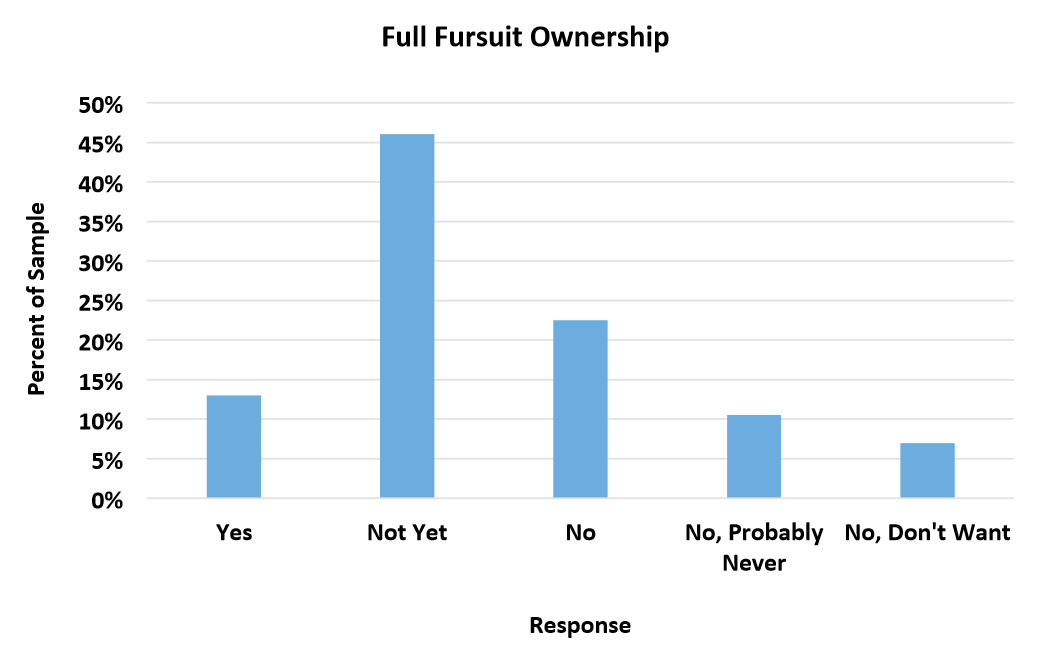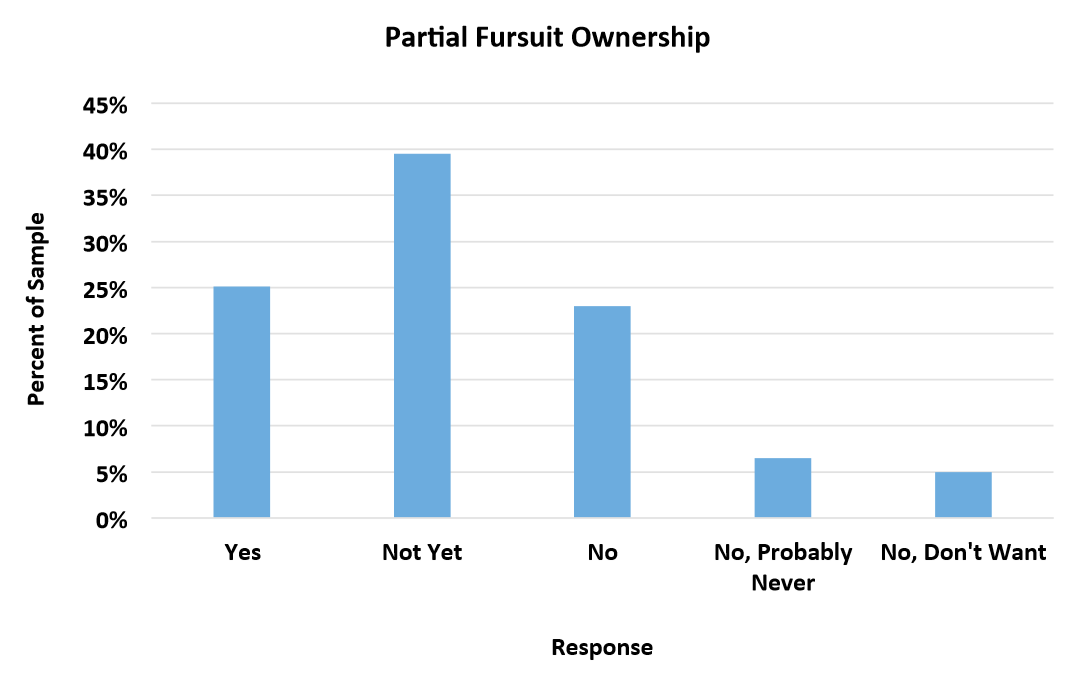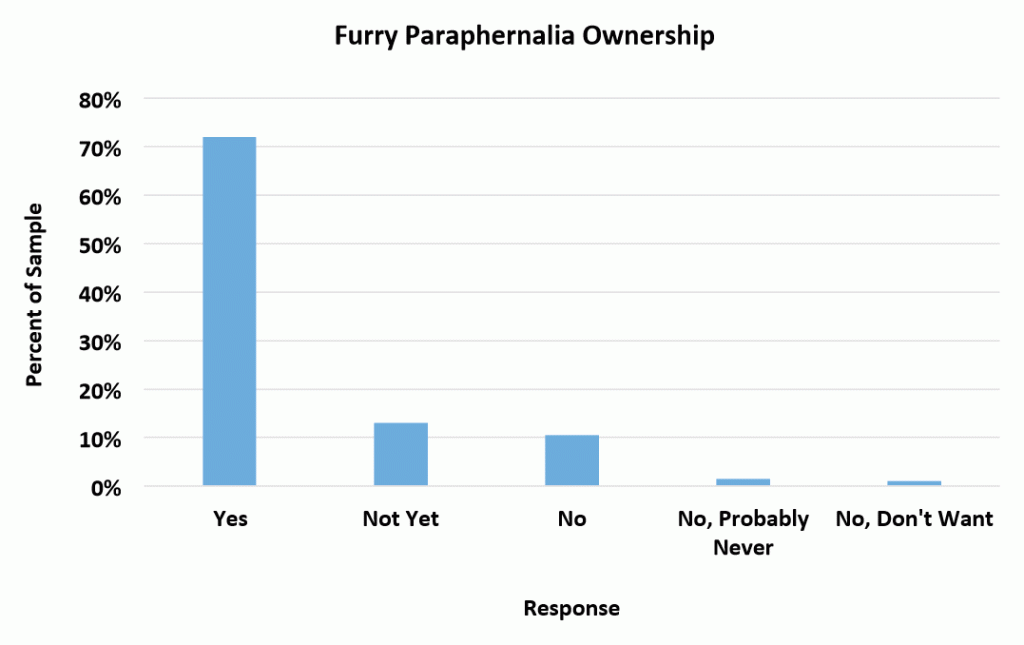In popular culture (and sometimes in the furry community itself), furries are often reduced to “fursuiting,” with furries being defined as people who wear these anthropomorphic animal suits. It should be noted that fursuits are, for many furries, prohibitively expensive and require intensive time and skill to create and, as such, there are many furries who, despite wishing to own a fursuit, are unable to. Moreover, there are many furries whose interest in furry content simply does not manifest itself as a desire to dress up in a fursuit. Despite this, furries are routinely conflated with fursuiters, a misconception we aimed to test empirically.
In one study, 1 participants were asked whether they owned a full fursuit (defined as including a head, paws, torso and tail, where applicable), a partial fursuit (defined as owning at least two or three of the above items), or owned furry paraphernalia (ears, tail, paws, clothes, buttons, etc.). Specifically, they were asked, for each item, whether they owned it, did not yet own it (but intended to), did not own it, did not own it and probably would never own it, or whether they did not own it and did not want to own it. The results are displayed in the figures below.
The results indicate that only about 10-15% of furries actually owns a fursuit (though the results also indicate that far more—nearly 50%—are interested in acquiring one). Additionally, only about 25% of furries owns a partial fursuit (with many more interested in owning a partial fursuit in the future). The data therefore dispel the common misconception that furries are all fursuiters.
While we often find few differences between our samples of convention-going furries and online samples of furries, one of the few fairly consistent differences between the groups relates to fursuit ownership. While prior studies have suggested that fursuit ownership is fairly uncommon in the furry fandom in general (e.g., 15-25%), our Anthrocon 2018 sample found that 45.8% of furries owned a partial or full fursuit. One likely reason for this difference between convention-going and online furry samples is the fact that those who own a fursuit will be drawn to conventions, where they have the opportunity to wear and display their suit in public. Another possible explanation is the fact that fursuits are often prohibitively expensive, and furries who are able to afford a suit are also more likely to be able to afford the expense of traveling to attend a convention.2
While most furries do not own a fursuit, the figure above indicates that most furries do, however, own wearable indicators of their furry identity. 3 In a subsequent study, we assessed the popularity of specific pieces of furry paraphernalia.4 The most popular (and among most frequently worn) accoutrements were tails, though it’s worth noting that, even then, fewer than half of furries owned one. Those who owned fursuits wore them regularly (e.g., at conventions/events), which is consistent with the cost and resources required to acquire or create a fursuit.
Ownership of Different Furry-Themed Accouterments
| Item | % of furries who own |
% of owners who regularly wear |
| Ears | 27.3 | 62.6 |
| Tail | 48.1 | 78.0 |
| Paws | 25.9 | 50.2 |
| Head | 16.7 | 47.3 |
| Fursona’s Clothing | 34.3 | 82.2 |
| Wings | 1.9 | 26.3 |
| Accessories | 36.6 | 79.8 |
| Partial Fursuit | 18.5 | 72.4 |
| Full Fursuit | 13.0 | 85.4 |
Recently, we have begun studying the characteristics of furries who do own fursuits to determine whether they differ from furries who do not own fursuits. In one particularly extensive study,5 several new facts were discovered about fursuiters:
- Fursuiters do not identify any more strongly as a furry, with the furry community, or with their fursonas than non-fursuiter furries do
- Only 61% of fursuiters are men, despite the fact that men comprise more than 75% of the furry fandom. Put another way: furry women are more likely to fursuit than furry men.
- Fursuiters are no more likely to be therian than non-fursuiters; they are also no more likely to feel non-human or to want to be completely non-human if they could
- Fursuiters have been in the fandom for longer, on average, than non-fursuiters; they also have more expendable income
- Fursuiters report better psychological well-being and a better-identified sense of self than non-fursuiters; they were no more likely to experience anxiety issues or to consider themselves to be immature, though they do report experiencing more discrimination for being a furry than non-suiters
- Fursuiters like hugs just as much as non-fursuiters do. Moreover, they are less likely than non-suiters to say that they don’t get as many hugs as they’d like in their day-to-day life.
In past studies, we’ve looked at, and found, differences between fursuiters and non-fursuiters. In a 2018 study, we took a different approach, asking fursuiters to indicate the extent to which they agree or disagree with different facets about fursuiting. Taken together, the statements seem to support the idea that many fursuiters feel a sense of confidence and disinhibition (i.e., freedom to be themselves, freedom from social norms) when suiting, and find it easier to interact with others when doing so. Furries seem to be more divided when it comes to whether their fursuits allow them to be less judged about their sexuality or gender.6
| Item | Results |
| I’ve customized my fursuit or made parts of it myself. | Fairly evenly divided, but slightly more likely than not to say they have customized or made parts of their suit. |
| It’s easier to interact with people I don’t know when I’m in my fursuit | The vast majority of fursuiters agreed. |
| When I fursuit, I do things that would normally be difficult or impossible for me to do when out of suit | The vast majority of fursuiters agreed. |
| The fursuit or fursuits I own each have their own unique fursona, or some of them do | The vast majority of fursuiters agreed. |
| I care more about what others think of me when I’m wearing my fursuit | The vast majority of fursuiters disagreed. |
| I act differently when I’m wearing my fursuit | The vast majority of fursuiters agreed. |
| It’s easier to meet new people when I’m in my fursuit | The vast majority of fursuiters agreed. |
| It’s easier to interact with people I know when I’m in my fursuit | Furries were fairly divided about this item, with only a slight tendency to agree. |
| I feel less judged in regards to my sexuality when I’m in my fursuit | Furries were very divided about this item, with almost equal numbers agreeing, disagreeing, and being in the middle about it. |
| I feel more confident when I’m wearing my fursuit | The vast majority of fursuiters agreed. |
| I care less about what others think of me when I’m wearing my fursuit | The vast majority of fursuiters agreed. |
| Wearing my fursuit allows others to see the real me | Furries were quite divided about this item, with only a slight tendency for fursuiters to agree. |
| I feel less constrained by my assigned gender (what others think my gender is or ought to be) when I’m in my fursuit | Furries were fairly divided about this item, with a small tendency for fursuiters to disagree. |
| Wearing my fursuit allows others to see another side of me | The vast majority of fursuiters agreed. |
| I feel less judged in regards to my personality when I’m in my fursuit | The vast majority of fursuiters agreed. |
| I feel more accepted by others when I’m wearing my fursuit than when I am not wearing it | The vast majority of fursuiters agreed. |




Recent Comments